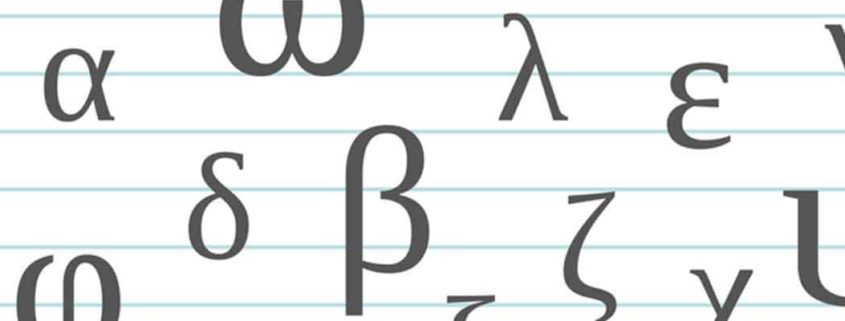The Greek alphabet is unique and special. It has survived thousands of years without significant changes. From the times of Omiros and Platonas, in Byzantine and Kavafis, it ended up in our times with barely any changes to it.
The Omilo teachers are happy to help you learning this beautiful Greek Alphabet!
And by the way, it is much easier than it might look.
But first a question; Maybe you have heard of Greeklish, and are wondering why to learn the Greek Alphabet, since you can also write in Greeklish?
For those of you not knowing the term “Greeklisch”, here a small explanation :
What is Greeklish?
Writing Greek with Latin Characters!
The Greek Alphabet has to respond to changes that are not particularly favored. In the environment of computers where everything happens quickly and obligatorily in the simplest way possible, it seems that the Greek alphabet has started losing ground.
This trend of using “Greeklish” started with mobile phones and the internet, since it was easier and quicker to use Latin characters on those devices:
1) Less letters are used and hence more writing space,
2) There are no grammar rules so the writing of the messages becomes a faster procedure. Of course this trend started from the younger generations, but today Greeklish is also used by the older generations.
Of course, over the last decades, there has been a huge debate about whether or not the Greek language is in danger due to Greeklish.
On the one hand, many support that the danger is high for the particular nature of the language is getting lost.
The spelling they say signifies a lot about the roots and the meaning of each word.
On the other hand, there are the advocates of Greeklish who claim that a language must serve the needs of the people who use it.
The internet requires quick actions and an easy way of writing.
Besides, the language is an alive organism which keeps on evolving and we have to observe it without being stuck to the past.
There are no grammar rules for Greeklish.
In general terms it has to do with the pronunciation of the language, for example: Ti kaneis/kanis? Ola kala?
Moreover in Greeklish abbreviations are very common:
φιλάκια: filakia or flk (kisses)
τα λέμε: ta leme ή tlm. (see you)
Of course the English terms and abbreviations are also used often: asap, btw…
Below are a few “rules” for the translation of the words:
θ: th or 8 ex. θάλασσα: thalassa/8alassa
ξ: ks,x, 3 ex. ξένος: ksenos, xenos, 3enos
ψ: ps, y ex. ψέμα: psema, yema
ω: o, w ex. τώρα: tora, twra
δ: d, 6 ex. δεν: den, 6en
η: i, h ex. ήλιος: ilios, hlios.
The difficult part though is not really in writing the Greeklish but rather in reading it!
Try for example to read the below conversation. Can you do it?
-kalhmera! ti kns?
-kl. esi? Pws paei shmera?
-Pl douleia sto grafeio. 8a se dw to vra6i?
– eda3ei. T wra?
-9-9misi.
-ok. tlm.
The Benefits of Learning The Greek Alphabet
As you understood, you might write in Greeklish yourself, but you will not be able to read anything when somebody writes you in Greek, neither you can read any signs or notes, when visiting Greece.
Wouldn’t it be nice, while in Greece, to be able to read a Greek menu-card, street names, the destination of a bus or simply have a good pronunciation in Greek ?
From the moment you know the Alphabet, you will also know exactly how every word is pronounced.
So, it is a good time start learning the 24 Greek Letters. This video will help you out 🙂
+++++++++++++++
Did you like the sound of Greek, and writing a different alphabet?
If so, then you can master the Greek Alphabet, but also learn your first sentences in Greek.
Then take a look at our Multi-Media Alphabet course, and learn the Greek Alphabet from any place, any time…
Click here for more information about the Greek Alphabet course




